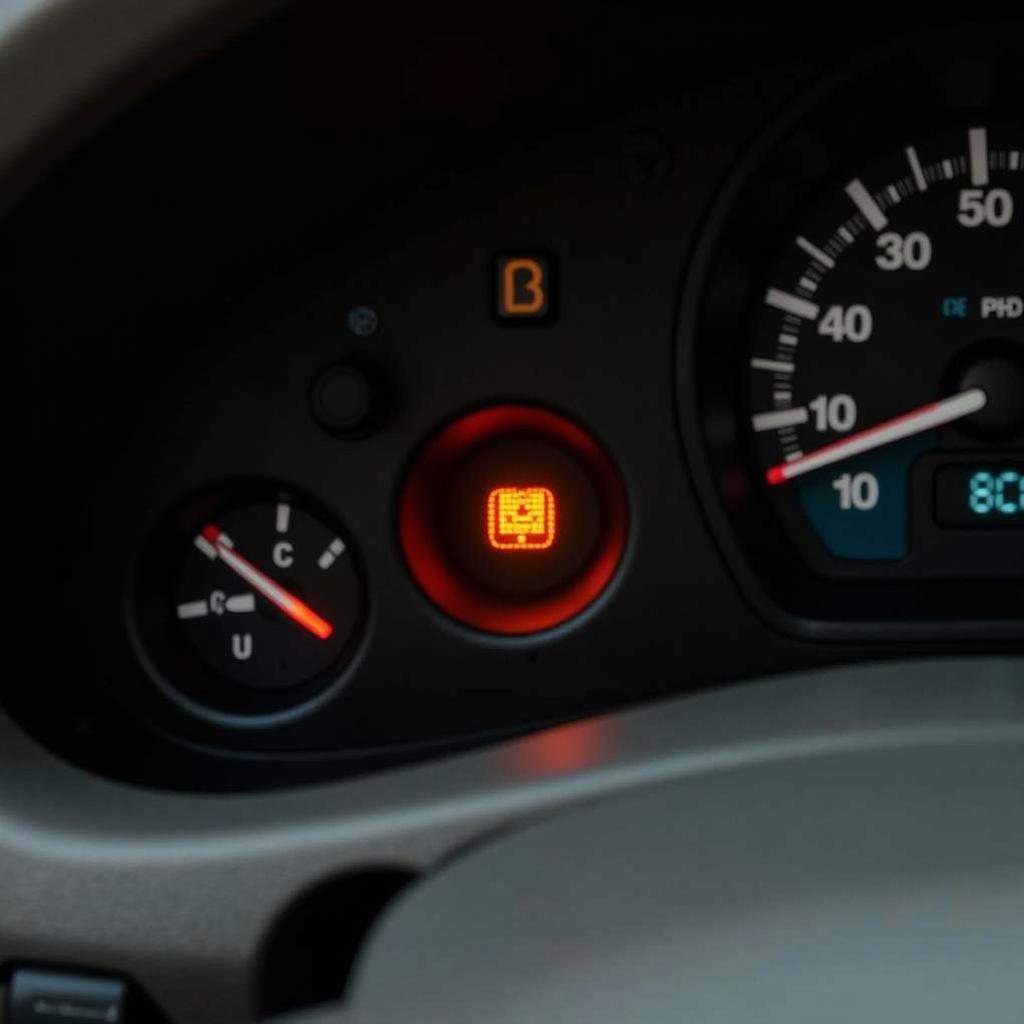The 2002 Toyota Prius is a groundbreaking vehicle, but even hybrids aren’t immune to issues. If you’re seeing a brake warning light on your 2002 Prius, this guide will walk you through the potential causes, diagnostics, and solutions. Don’t panic; a glowing brake light doesn’t always mean disaster. It’s simply your car’s way of saying, “Hey, something needs attention down here!”
 2002 Prius dashboard displaying a lit brake warning light
2002 Prius dashboard displaying a lit brake warning light
Understanding Your 2002 Prius Brake System
The 2002 Prius boasts a unique braking system that combines regenerative braking with traditional hydraulic brakes. This complex system can sometimes be the source of the warning light. Regenerative braking captures energy during deceleration to recharge the hybrid battery. However, the traditional hydraulic system is still crucial for stopping power, especially at lower speeds. Knowing this distinction is key to understanding potential issues. If you’ve noticed your car battery died from cold, this could indirectly affect your braking system. You might find helpful information in our article on this topic.
Common Causes of the 2002 Prius Brake Warning Light
The brake warning light can be triggered by various issues, ranging from simple to complex. Here’s a breakdown of the usual suspects:
-
Low Brake Fluid: This is often the easiest fix. Check the brake fluid reservoir and top it up if needed. Remember to use the correct brake fluid type specified in your owner’s manual.
-
Worn Brake Pads: Brake pads wear over time. If they get too thin, a sensor triggers the warning light. Replacing your brake pads will usually solve this.
-
Brake Fluid Leaks: Leaks in the brake lines or other components can lead to low brake fluid and trigger the warning light. This requires professional inspection and repair.
-
Faulty Brake Light Switch: The brake light switch activates your brake lights when you press the pedal. A malfunctioning switch can also cause the brake warning light to illuminate.
-
ABS Issues: The Anti-lock Braking System (ABS) helps prevent wheel lockup during hard braking. Problems with the ABS system, such as a faulty sensor, can trigger the warning light. For instances where a fiat 500 has a flat battery, similar brake issues might arise.
Diagnosing the Problem
A proper diagnosis is essential before attempting any repairs. If topping off the brake fluid doesn’t resolve the issue, it’s best to consult a qualified mechanic. They can use diagnostic tools to pinpoint the problem accurately. Some issues, like ABS problems, require specialized equipment. A mechanic can also check for leaks or other underlying problems. Perhaps surprisingly, sometimes the issue is as simple as a dead battery, especially after jump-starting a car with a completely dead battery.
What to Do When the Brake Warning Light Comes On
-
Pull over safely: If the light comes on while driving, find a safe place to stop and assess the situation.
-
Check the brake fluid: Inspect the brake fluid reservoir. If it’s low, top it off and see if the light goes off.
-
Inspect the brake pedal: Feel for any unusual sponginess or if the pedal travels further than usual.
-
Listen for unusual noises: Any grinding or squeaking sounds could indicate worn brake pads.
-
Seek professional help: If the problem persists, contact a qualified mechanic for further diagnosis and repair.
Preventing Future Brake Problems
Regular maintenance is crucial for preventing brake issues. This includes:
- Regular brake inspections: Have your brakes inspected at least once a year or as recommended in your owner’s manual.
- Brake fluid flushes: Flush your brake fluid every two to three years to prevent corrosion and maintain optimal performance.
If you jumped your car and it died again, it’s a sign that there’s a deeper electrical issue that needs addressing, which may also be linked to your brake warning light. For more information on the causes of battery discharge in car, you can refer to our dedicated article.
Conclusion
The 2002 Prius brake warning light serves as a vital indicator of potential problems. Addressing the issue promptly can prevent further damage and ensure your safety on the road. While some fixes are simple, others require professional attention. Don’t ignore the warning; take action to keep your Prius braking smoothly and safely.
FAQ
- Can I drive my 2002 Prius with the brake warning light on? It’s not recommended. While you might still have some braking power, continuing to drive could worsen the problem and compromise safety.
- How much does it cost to fix a 2002 Prius brake warning light issue? The cost varies depending on the underlying problem. A simple brake fluid top-up is inexpensive, while more complex repairs, like ABS issues, can be more costly.
- How often should I check my 2002 Prius brake fluid? Checking your brake fluid level monthly is a good practice.
- What type of brake fluid does a 2002 Prius use? Consult your owner’s manual for the specific brake fluid type recommended for your Prius.
- Can worn brake pads cause the brake warning light to come on? Yes, worn brake pads often trigger the brake warning light.
- What should I do if my brake pedal feels spongy? A spongy brake pedal indicates a potential problem with the braking system and requires immediate inspection by a qualified mechanic.
- Is the 2002 Prius braking system different from conventional cars? Yes, the 2002 Prius uses a combination of regenerative and hydraulic braking, making it unique compared to traditional braking systems.

